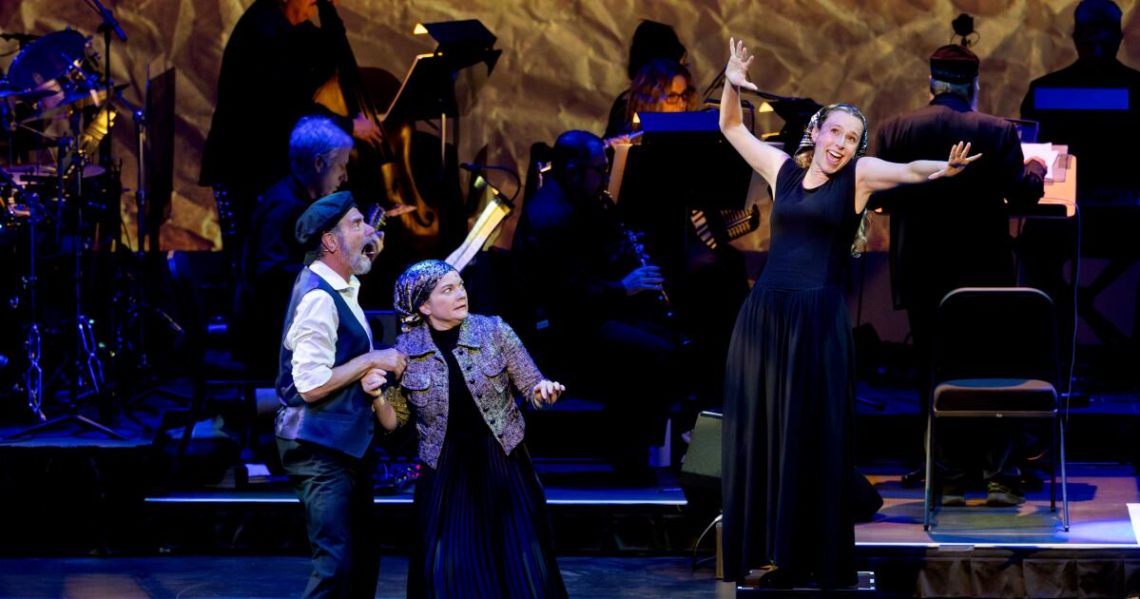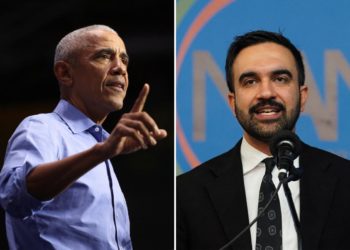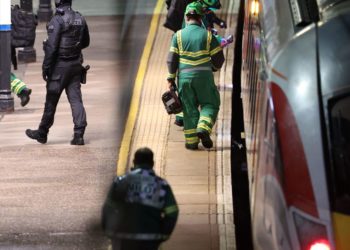Magnificent.
The concert version of the National Yiddish Theatre Folksbiene’s celebrated production of “Fiddler on the Roof” in Yiddish had its West Coast premiere at the Soraya last weekend, and anyone who was lucky enough to attend one of the three performances will long cherish the memory of this stunning musical experience.
Performing “Fiddler” in Yiddish returns the characters to the language of Sholem Aleichem’s stories, the fictional world from which they sprung. The musical has been translated but in a way that moves Joseph Stein’s book, Jerry Bock’s music and Sheldon Harnick’s lyrics closer to an authentic Anatevka, the village in which Tevye the milkman lives with his wife, Golde, and five daughters.
The one concern I had about a Yiddish “Fiddler” was the loss of Harnick’s piercingly simple lyrics. Harnick had a way of expressing deep universal truths in the most natural, folksy manner possible. But, fortunately, his words weren’t absent from the production. English supertitles, spotlighting Harnick’s unmatched skill, were projected prominently behind the orchestra.
The language was often comprehensible even for non-Yiddish speakers. The rich man in “If I Were a Rich Man” was translated as a variant of Rothschild, the name of a well-known European Jewish banking dynasty. And even if that reference eluded anyone, Bock’s bouncing, daydreaming, old world melody, practically encoded into our cultural DNA, assured perfect understanding.
Joel Grey, the Oscar and Tony winning Master of Ceremonies of “Cabaret,” directed both the concert and the National Yiddish Theatre Folksbiene’s production, which began in New York in 2018 at the Museum of Jewish Heritage before opening off-Broadway at New World Stages in 2019. In 2022, the show returned for another run at New World Stages, satisfying the demand for one of the most talked about musical revivals of the last few years.
The 93-year-old Grey was in attendance at Saturday’s opening at the majestic Soraya. He was also a presence on screen, providing both the introduction and epilogue of what was an artfully conceived hybrid experience, a concert version of the musical focused on the songs but contextualized sufficiently to bring the audience emotionally into the story.
The orchestra, conducted by National Yiddish Theatre Folksbiene artistic director Zalmen Mlotek, gracefully guided the flow of scenes. The superb company of actors, led by Steven Skybell’s Tevye, performed musical selections arranged around brief narration and dramatic excerpts.
A commanding presence, Skybell isn’t a barnstormer but an Obie-winning actor who illuminates the humanity of whatever role he happens to be playing. His Tevye, a patriarch trying to hold his family together amid the double assault of poverty and pogroms, was especially touching in his appeal to the Almighty to ease up on the litany of suffering.
A violinist (Sara Parkins) shadowed Tevye with the haunting strains of cultural “tradition” — a loaded word. But he is forced to adapt to changing times. It’s 1905, and Anatevka isn’t the shtetl that it once was.
Revolution is in the air, and Tevye’s daughters have their own minds about their marital prospects. How does “the papa,” the upholder of tradition, as the musical’s opening number spells out, maintain his self-respect, if not his authority? The only way he can — by balancing out fits of temper with the sympathetic humor of a father’s loving heart.
“Fiddler” can sometimes occasion a flood of overacting. Not here. The daughters were too wrapped up in the most consequential decision of their lives — their choice of husbands — to chew scenery. Rachel Zatcoff as Tsaytl, Yael Eden Chanukov as Hodl and Rosie Jo Neddy as Khave channeled their ardent emotion into their singing.
Zatcoff’s Tsaytl embodied the mature conviction that Kirk Geritano’s Motl, the poor tailor, is the only man for her. Chanukov’s Hodl, more anxious but no less resolved, made clear that her future could only be with Drew Seigla’s Pertshik, a revolutionary student. And Neddy’s Khave revealed that she was prepared to sacrifice everything to be with Griffith Frank’s Fyedka, a Russian Christian, no matter the effect on her family or herself.
What’s remarkable for a concert is how much of the production’s character work came through. In the musical number “Do You Love Me?,” when Tevye asks his wife what turns out to be a not-so-simple question, the history of an arranged marriage that has stood the test of time was laid bare. The way Jennifer Babiak’s no-nonsense Golde refused to spit out an easy answer was as telling as the gentle way Skybell’s Tevye kept prodding her to admit a truth that was perhaps too complex for words.
The humor of “Fiddler” was well accounted for in Lisa Fishman’s Yente, the matchmaker involved in everybody’s business. Samuel Druhora’s Leyzer Volf, the prosperous widower butcher eager to marry Tsaytl, played the heavy but with a soft human touch that allowed him to join in the laughter.
The Hebrew word for Torah was projected across the rear of the stage, summoning part of the original production design. The defined religious and social world, rooted in a cultural specificity, was all the more universal for its vivid particularity.
This version of “Fiddler” in Yiddish elicited in me a poignant longing for an America that once understood itself as a nation of immigrants, bound together by the dream of a better life, regardless of creed or national origin or accent.
“Fiddler on the Roof,” perhaps the most unifying American musical of the 20th century, reminds us of the long, hard road many of our ancestors traveled to arrive at a country founded on (however imperfectly realized) democratic ideals. I’m thinking now of my parents and grandparents, but also of my students, whose families come from different parts of the world but whose paths follow a similar trajectory.
It’s a pity that this concert had such a brief run. But how lucky to experience at this fragile moment the values of generosity and empathy underlying this classic American musical — values that once made it possible to transcend our political differences and find ourselves in each other’s stories.
The post A Yiddish version of ‘Fiddler on the Roof’ at the Soraya shined a light in a darkened America appeared first on Los Angeles Times.




